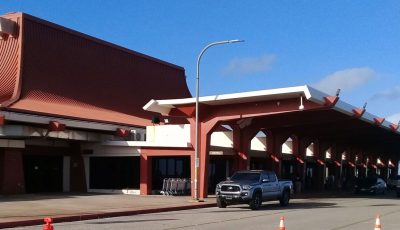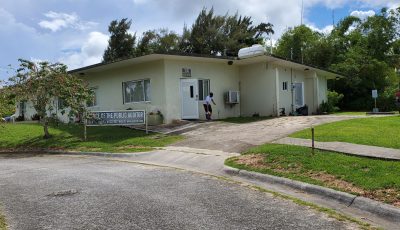FAA execs: No final ruling that OPA fee is ‘revenue diversion’
Sablan proposes amendments to a bill that exempt autonomous agencies from paying OPA fee
Two Federal Aviation Administration officials have acknowledged that FAA has no definitive opinion that says that the Commonwealth Ports Authority cannot pay the 1% Office of the Public Auditor fee that all autonomous agencies and corporations have to pay and that there must be a breakdown of all the services that OPA provides, including potential investigations.
As this developed, Rep. Christina E. Sablan (D-Saipan) proposed yesterday during a House of Representatives Ways and Means Committee meeting some amendments to House Bill 22-102, which would exempt public corporations and autonomous agencies from paying the 1% OPA fee. Instead of exempting the entire CPA from paying the OPA fee, Sablan proposed a temporary exemption for CPA’s airport revenue only, since CPA doesn’t dispute being charged the fee for non-airport revenue.
Sablan informed members of the Ways and Means Committee that that during their meeting Tuesday with two FAA officials—Victor Globa, program manager for compliance for the Western-Pacific Region; and Carlos Salas, deputy manager for Honolulu Airports District Office—the main question was whether the 1% OPA fee that all autonomous agencies are required to pay from their operations budget constitutes unlawful revenue diversion for CPA.
Sablan said Globa and Salas stated that it may be considered revenue diversion, but it depends.
“So they…couldn’t give us…a final determination right then and there, that it is, in fact, revenue diversion,” she said.
The lawmaker said the two FAA officials did express concern that CPA may be in jeopardy of being placed in non-compliance, and may be at risk of losing federal funds.
“But they also said that it all depends on whether there is an approved cost allocation plan. It depends on how these OPA fees are actually used,” she noted.
Sablan said the FAA officials’ main concern was to ensure that airport revenues are used for airport operations, maintenance and infrastructure projects, as required by the federal grant assurances, and by federal law.
The committee approved the substitute bill. It was amended on the floor to create a sunset clause and extend it from three years to five years. Committee chairman Rep. Donald M. Manglona (Ind-Rota) offered the amendment in what he described as “a spirit of compromise.”
During Tuesday’s meeting with FAA, CPA, OPA, and Department of Finance that was presided over by Senate President Jude U. Hofschneider (R-Tinian) in the House chamber, Sablan asked FAA if there is a definitive opinion that CPA cannot pay this 1% OPA fee and that there must be a breakdown of OPA’s services provided.
Globa said he can’t give a definite response and that if Sablan wants, she should request that in writing, which specifically states all the scenarios that she has, and that they are more than happy to run it to their headquarters and have them provide a response on that.
“But again, based on the 1% straight across-the-board and saying we’re [going to] give [OPA] 1% of the revenues here, we believe that would be revenue diversion,” Globa said.
He said unless there’s something different that Sablan can tell them why that wouldn’t be considered revenue diversion, then he is more than happy to give her the individual who she needs to contact in order to be able to get a clear definition out of that.
At Tuesday’s meeting, Globa also stated that while they understand the requirements and the necessity of having audits, from a public perspective there’s a challenge in how it’s going to be done.
Globa said the airport currently has single audits that are done every year, they hire consultants to do that, and they go through a request-for-proposal process to do so.
And while having an OPA 1% fee may be a law on the books, at this point there isn’t anything that shows them how that fee comes into play, Globa said.
He noted that what’s even more concerning is the idea that if it only costs $50,000 or $60,000 for CPA to do a single audit, and they’re paying $140,000 into the fund, the bulk of that money goes back to general revenues.
“And this is an airport that’s trying to be self-sustaining. The money that they earn needs to be going back into the airport itself,” Globa said.
He said the idea to subsidize other departments in doing so is of concern to them.
Globa said if OPA wants to do an audit of CPA, they can do so, but they have to go through a cost allocation plan.
He said the federal government has no issues with paying those funds, but they need to know what those rates are and what’s going to be done. “And it has to be included as part of that cost allocation plan,” the FAA official pointed out.
Salas said if the 1% is taken out of CPA, the question really is that, based on the actual costs of doing the audit, is that the services that CPA is paying for and is it an actual costs?
“So that’s kind of the big questions from FAA’s standpoint. If it’s not, then it would have to be based on actual costs,” Salas said.
He said if this 1% fee continues, it will continue to be a concern and it will have an impact on the grants that the FAA issues and awards to CPA and any other airports that are in the same situation.
In outlining OPA’s regulatory functions in the CNMI, Public Auditor Kina B.Peter said the 1% fee has been a framework that’s been in place many years now and it is a fixed rate that is imposed on all CNMI entities and the autonomous agencies and public corporations.
“I do understand the concern with regards to whether there’s a cost plan of what’s allowable [or] not allowable. But when we look at it from an accounting policy standpoint, OPA’s fees would be considered or could be considered an overhead costs, indirect costs, however you want to categorize it,” she said.
Peter said she would consider OPA’s 1% fee as the cost of CPA being governed by OPA as a regulatory agency.
Sablan yesterday proposed, among other amendments to the bill, that they recognize that CPA and federal grantor have expressed concern that the 1% OPA fee from airport revenues may constitute unlawful revenue diversion, and could lead to CPA’s placement and non-compliance with federal grant conditions as well as sanctions.
Sablan proposed to include language that there is no final determination from federal grantor that the 1% OPA fee is, in fact, unlawful revenue diversion.
“So a key provision of this substitute bill is to provide for a sunset provision of three years. So this should be a temporary exemption three years, we think should be enough time for OPA, for all the agencies to resolve the dispute and really come to a determination of whether or not this 1% fee is in fact, revenue diversion,” she said.




























